
The Prince-electors of the Holy Roman Empire, or Electors for short, were the members of the electoral college that elected the Holy Roman Emperor.

Louis IV, called the Bavarian, of the house of Wittelsbach, was King of the Romans from 1314, King of Italy from 1327, and Holy Roman Emperor from 1328.

Wenceslaus was, by inheritance, King of Bohemia from 1363 and by election, German King from 1376. He was the third Bohemian and fourth German monarch of the Luxembourg dynasty. Wenceslaus was deposed in 1400 as King of the Romans, but continued to rule as Bohemian king until his death.

Rupert of the Palatinate, sometimes known as Robert of the Palatinate, a member of the House of Wittelsbach, was Elector Palatine from 1398 and King of Germany (rex Romanorum) from 1400 until his death.
Philip of Swabia was a prince of the House of Hohenstaufen and king of Germany from 1198 to 1208. In the long-term struggle for the German throne upon the death of Emperor Henry VI between the Hohenstaufen and Welf dynasties, he was the first German king to be assassinated.

Adolf was Count of Nassau from about 1276 and elected King of Germany from 1292 until his deposition by the prince-electors in 1298. He was never crowned by the Pope, which would have secured him the title of Holy Roman Emperor. He was the first physically and mentally healthy ruler of the Holy Roman Empire ever to be deposed without a papal excommunication. Adolf died shortly afterwards in the Battle of Göllheim fighting against his successor Albert of Habsburg.
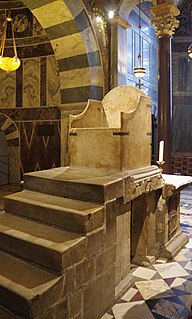
King of the Romans was a title used by Syagrius, then by the German king following his election by the princes from the time of Emperor Henry II (1014–1024) onward. The title was predominantly a claim to become Holy Roman Emperor and was dependent upon coronation by the Pope.
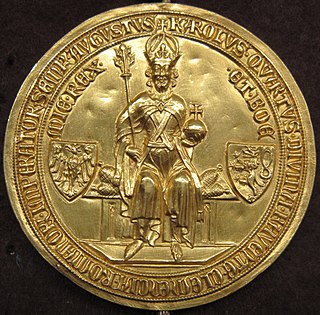
The Golden Bull of 1356 was a decree issued by the Imperial Diet at Nuremberg and Metz headed by the Emperor Charles IV which fixed, for a period of more than four hundred years, important aspects of the constitutional structure of the Holy Roman Empire. It was named the Golden Bull for the golden seal it carried.

Frederick the Handsome or the Fair, from the House of Habsburg, was Duke of Austria and Styria from 1308 as Frederick I as well as King of Germany from 1314 as Frederick III until his death.
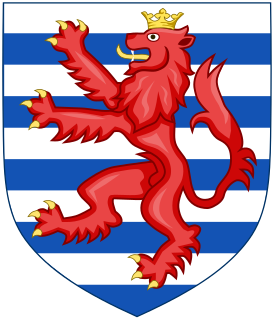
The Limburg-Luxemburg dynasty, one of several families from different periods known as the Luxembourg dynasty was a royal family of the Holy Roman Empire in the Late Middle Ages, whose members between 1308 and 1437 ruled as King of the Romans and Holy Roman Emperors as well as Kings of Bohemia and Hungary. Their rule was twice interrupted by the rival House of Wittelsbach.

The Battle of Mühldorf was fought near Mühldorf am Inn on September 28, 1322 between the Duchy of (Upper) Bavaria and Austria. The Bavarians were led by the German king Louis of Wittelsbach, while the Austrians were under the command of his cousin, the anti-king Frederick of Habsburg.
Louis V, called the Brandenburger, a member of the House of Wittelsbach, ruled as Margrave of Brandenburg from 1323 to 1351 and as Duke of Bavaria from 1347 until his death. From 1342 he also was co-ruling Count of Tyrol by his marriage with the Meinhardiner countess Margaret.
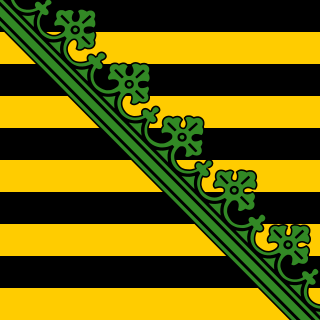
The Duchy of Saxe-Wittenberg was a medieval duchy of the Holy Roman Empire centered at Wittenberg, which emerged after the dissolution of the stem duchy of Saxony. The Ascanian dukes prevailed in obtaining the Saxon electoral dignity until their duchy was finally elevated to the Electorate of Saxony by the Golden Bull of 1356.

The election of a Holy Roman Emperor was generally a two-stage process whereby, from at least the 13th century, the King of the Romans was elected by a small body of the greatest princes of the Empire, the prince-electors. This was then followed shortly thereafter by his coronation as Emperor, an appointment that was normally for life. In 1356, the Emperor Charles IV promulgated the Golden Bull, which became the fundamental law by which all future kings and emperors were elected. After 1508, the Pope recognized election alone to be sufficient for the use of the Imperial title. The last papal coronation took place in 1530.
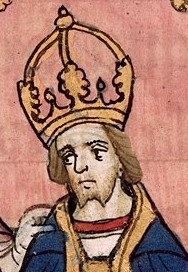
Henry VII was the King of Germany from 1308 and Holy Roman Emperor from 1312. He was the first emperor of the House of Luxembourg. During his brief career he reinvigorated the imperial cause in Italy, which was racked with the partisan struggles between the divided Guelf and Ghibelline factions, and inspired the praise of Dino Compagni and Dante Alighieri. He was the first emperor since the death of Frederick II in 1250, ending the Great Interregnum of the Holy Roman Empire; however, his premature death threatened to undo his life's work. His son, John of Bohemia, failed to be elected as his successor, and there was briefly another anti-king, Frederick the Fair contesting the rule of Louis IV.
Rudolf I, a member of the House of Ascania, was Duke of Saxe-Wittenberg from 1298 until his death. By the Golden Bull of 1356 he was acknowledged as Elector of Saxony and Marshall of the Holy Roman Empire.

The imperial election of 1273 was an imperial election held to select the emperor of the Holy Roman Empire. It took place in Frankfurt on October 1.

The imperial election of October 19, 1314 was an imperial election held to select the emperor of the Holy Roman Empire. It took place in Sachsenhausen, near Frankfurt.

The imperial election of October 20, 1314 was an imperial election held to select the emperor of the Holy Roman Empire. It took place in Frankfurt.

The Imperial election of 1257 was two imperial elections in the Holy Roman Empire held to select the emperor.

















